An Analytical Essay on Online Privacy for NIT2201 IT Ethics
VerifiedAdded on 2022/09/01
|8
|2120
|54
Essay
AI Summary
This essay, prepared for an IT Ethics course (NIT2201), delves into the critical aspects of online privacy, particularly within the Australian context. It examines the significance of privacy as a fundamental right, the challenges of digital privacy, and the role of loyalty cards in data collection. The essay explores various legal frameworks, including the Federal Privacy Act 1988, and discusses practical steps individuals can take to protect their digital information, such as using secure browsers, encryption, and strong passwords. It further analyzes the differences between Australian and European Union privacy laws, highlighting key distinctions in data breach notifications, consent requirements, and penalties. The essay concludes by emphasizing the importance of individual responsibility in safeguarding personal data and advocating for the formulation of new laws to address emerging privacy concerns related to new technologies and data collection practices. It stresses the need for robust measures to protect sensitive information and prevent unauthorized access, ultimately aiming to uphold the privacy of individuals in the digital age.
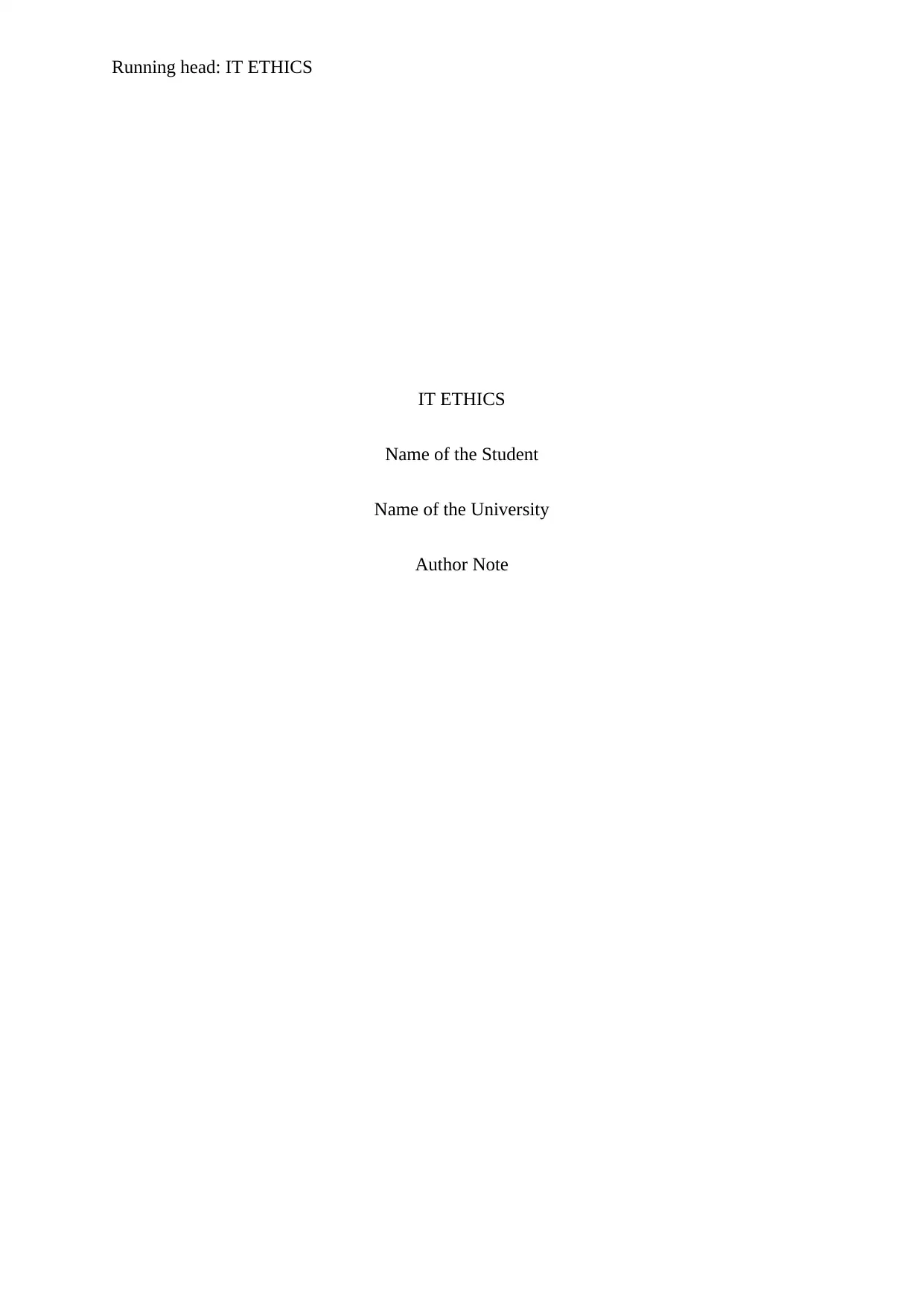
Running head: IT ETHICS
IT ETHICS
Name of the Student
Name of the University
Author Note
IT ETHICS
Name of the Student
Name of the University
Author Note
Paraphrase This Document
Need a fresh take? Get an instant paraphrase of this document with our AI Paraphraser
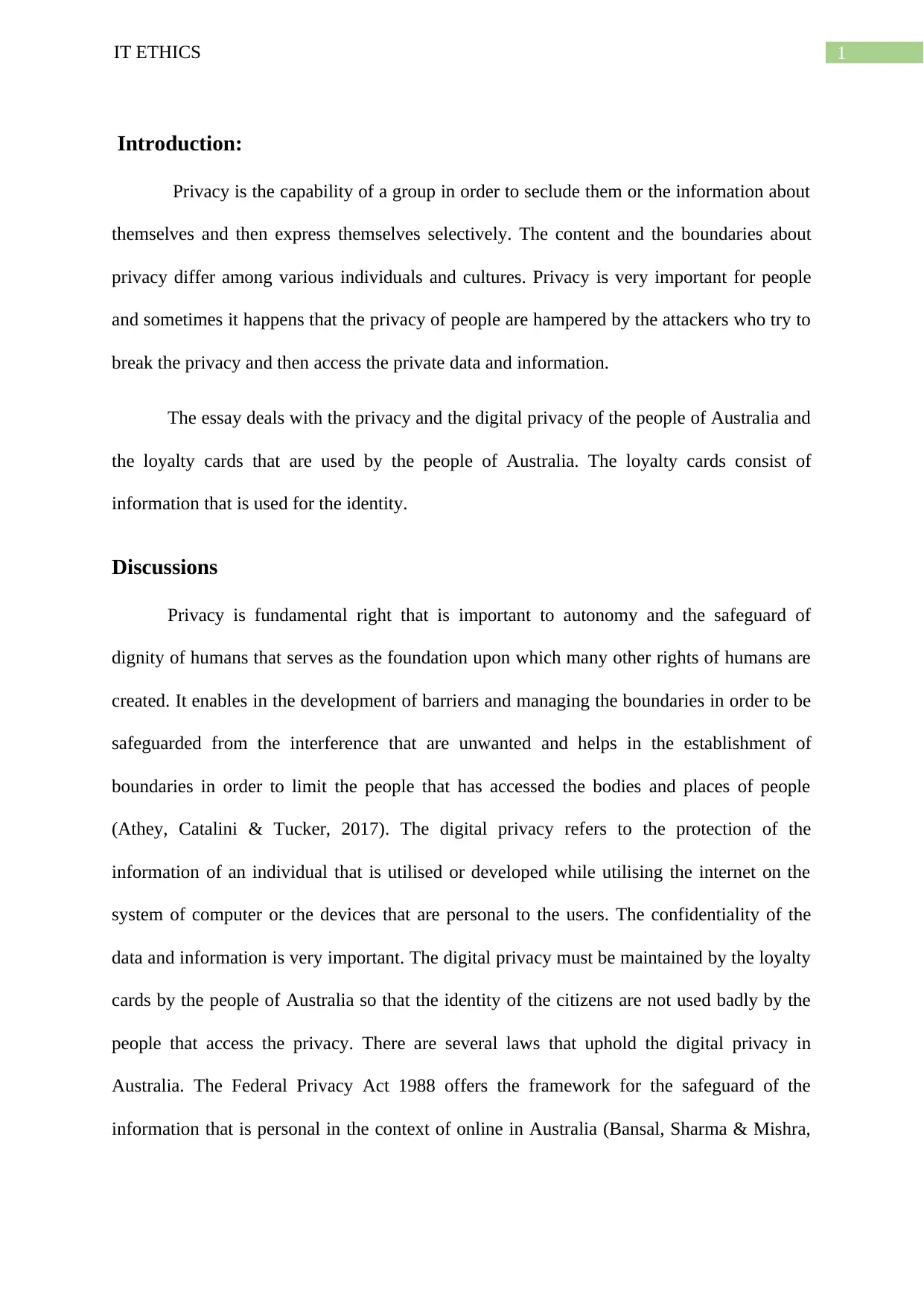
1IT ETHICS
Introduction:
Privacy is the capability of a group in order to seclude them or the information about
themselves and then express themselves selectively. The content and the boundaries about
privacy differ among various individuals and cultures. Privacy is very important for people
and sometimes it happens that the privacy of people are hampered by the attackers who try to
break the privacy and then access the private data and information.
The essay deals with the privacy and the digital privacy of the people of Australia and
the loyalty cards that are used by the people of Australia. The loyalty cards consist of
information that is used for the identity.
Discussions
Privacy is fundamental right that is important to autonomy and the safeguard of
dignity of humans that serves as the foundation upon which many other rights of humans are
created. It enables in the development of barriers and managing the boundaries in order to be
safeguarded from the interference that are unwanted and helps in the establishment of
boundaries in order to limit the people that has accessed the bodies and places of people
(Athey, Catalini & Tucker, 2017). The digital privacy refers to the protection of the
information of an individual that is utilised or developed while utilising the internet on the
system of computer or the devices that are personal to the users. The confidentiality of the
data and information is very important. The digital privacy must be maintained by the loyalty
cards by the people of Australia so that the identity of the citizens are not used badly by the
people that access the privacy. There are several laws that uphold the digital privacy in
Australia. The Federal Privacy Act 1988 offers the framework for the safeguard of the
information that is personal in the context of online in Australia (Bansal, Sharma & Mishra,
Introduction:
Privacy is the capability of a group in order to seclude them or the information about
themselves and then express themselves selectively. The content and the boundaries about
privacy differ among various individuals and cultures. Privacy is very important for people
and sometimes it happens that the privacy of people are hampered by the attackers who try to
break the privacy and then access the private data and information.
The essay deals with the privacy and the digital privacy of the people of Australia and
the loyalty cards that are used by the people of Australia. The loyalty cards consist of
information that is used for the identity.
Discussions
Privacy is fundamental right that is important to autonomy and the safeguard of
dignity of humans that serves as the foundation upon which many other rights of humans are
created. It enables in the development of barriers and managing the boundaries in order to be
safeguarded from the interference that are unwanted and helps in the establishment of
boundaries in order to limit the people that has accessed the bodies and places of people
(Athey, Catalini & Tucker, 2017). The digital privacy refers to the protection of the
information of an individual that is utilised or developed while utilising the internet on the
system of computer or the devices that are personal to the users. The confidentiality of the
data and information is very important. The digital privacy must be maintained by the loyalty
cards by the people of Australia so that the identity of the citizens are not used badly by the
people that access the privacy. There are several laws that uphold the digital privacy in
Australia. The Federal Privacy Act 1988 offers the framework for the safeguard of the
information that is personal in the context of online in Australia (Bansal, Sharma & Mishra,
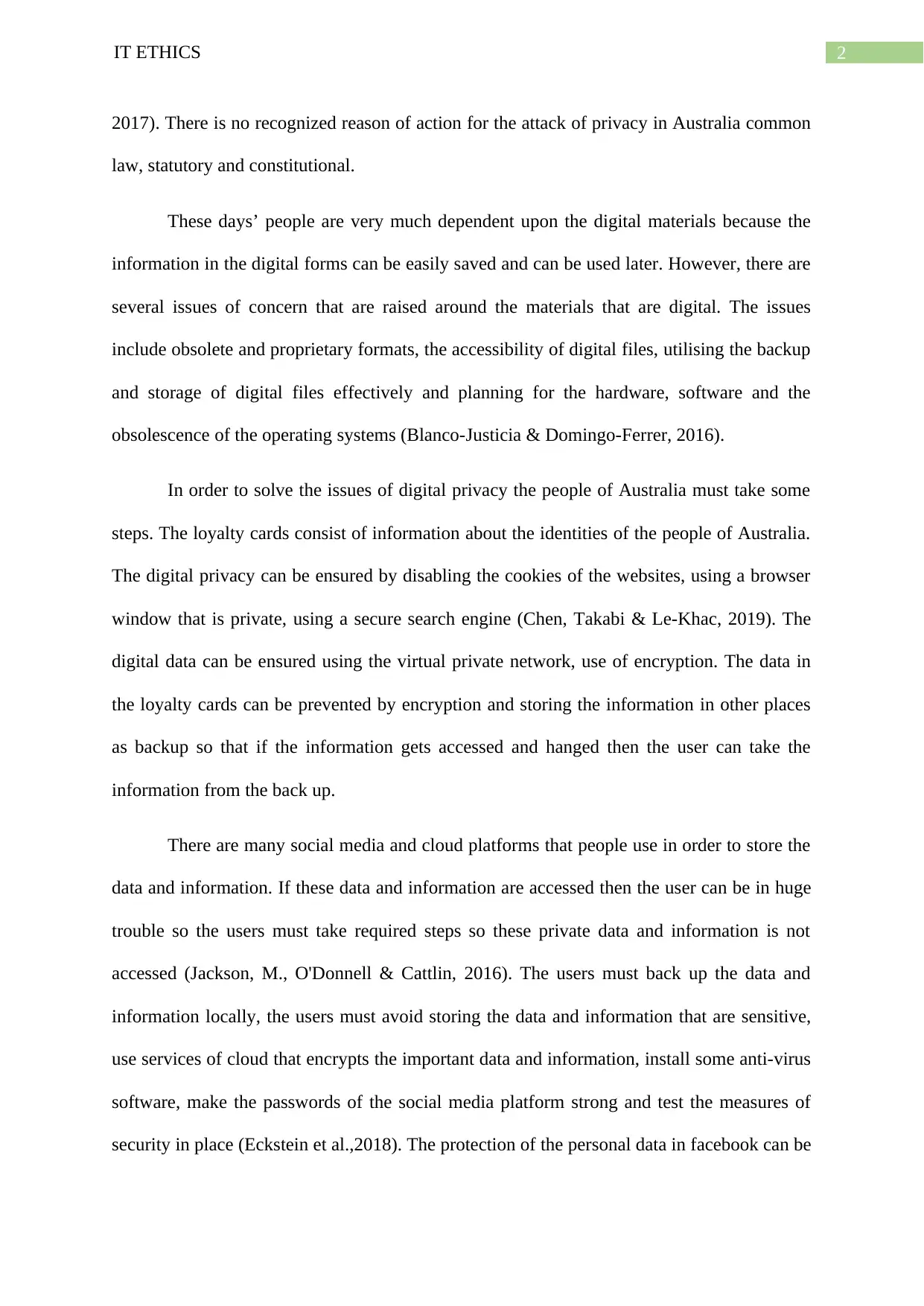
2IT ETHICS
2017). There is no recognized reason of action for the attack of privacy in Australia common
law, statutory and constitutional.
These days’ people are very much dependent upon the digital materials because the
information in the digital forms can be easily saved and can be used later. However, there are
several issues of concern that are raised around the materials that are digital. The issues
include obsolete and proprietary formats, the accessibility of digital files, utilising the backup
and storage of digital files effectively and planning for the hardware, software and the
obsolescence of the operating systems (Blanco-Justicia & Domingo-Ferrer, 2016).
In order to solve the issues of digital privacy the people of Australia must take some
steps. The loyalty cards consist of information about the identities of the people of Australia.
The digital privacy can be ensured by disabling the cookies of the websites, using a browser
window that is private, using a secure search engine (Chen, Takabi & Le-Khac, 2019). The
digital data can be ensured using the virtual private network, use of encryption. The data in
the loyalty cards can be prevented by encryption and storing the information in other places
as backup so that if the information gets accessed and hanged then the user can take the
information from the back up.
There are many social media and cloud platforms that people use in order to store the
data and information. If these data and information are accessed then the user can be in huge
trouble so the users must take required steps so these private data and information is not
accessed (Jackson, M., O'Donnell & Cattlin, 2016). The users must back up the data and
information locally, the users must avoid storing the data and information that are sensitive,
use services of cloud that encrypts the important data and information, install some anti-virus
software, make the passwords of the social media platform strong and test the measures of
security in place (Eckstein et al.,2018). The protection of the personal data in facebook can be
2017). There is no recognized reason of action for the attack of privacy in Australia common
law, statutory and constitutional.
These days’ people are very much dependent upon the digital materials because the
information in the digital forms can be easily saved and can be used later. However, there are
several issues of concern that are raised around the materials that are digital. The issues
include obsolete and proprietary formats, the accessibility of digital files, utilising the backup
and storage of digital files effectively and planning for the hardware, software and the
obsolescence of the operating systems (Blanco-Justicia & Domingo-Ferrer, 2016).
In order to solve the issues of digital privacy the people of Australia must take some
steps. The loyalty cards consist of information about the identities of the people of Australia.
The digital privacy can be ensured by disabling the cookies of the websites, using a browser
window that is private, using a secure search engine (Chen, Takabi & Le-Khac, 2019). The
digital data can be ensured using the virtual private network, use of encryption. The data in
the loyalty cards can be prevented by encryption and storing the information in other places
as backup so that if the information gets accessed and hanged then the user can take the
information from the back up.
There are many social media and cloud platforms that people use in order to store the
data and information. If these data and information are accessed then the user can be in huge
trouble so the users must take required steps so these private data and information is not
accessed (Jackson, M., O'Donnell & Cattlin, 2016). The users must back up the data and
information locally, the users must avoid storing the data and information that are sensitive,
use services of cloud that encrypts the important data and information, install some anti-virus
software, make the passwords of the social media platform strong and test the measures of
security in place (Eckstein et al.,2018). The protection of the personal data in facebook can be
⊘ This is a preview!⊘
Do you want full access?
Subscribe today to unlock all pages.

Trusted by 1+ million students worldwide
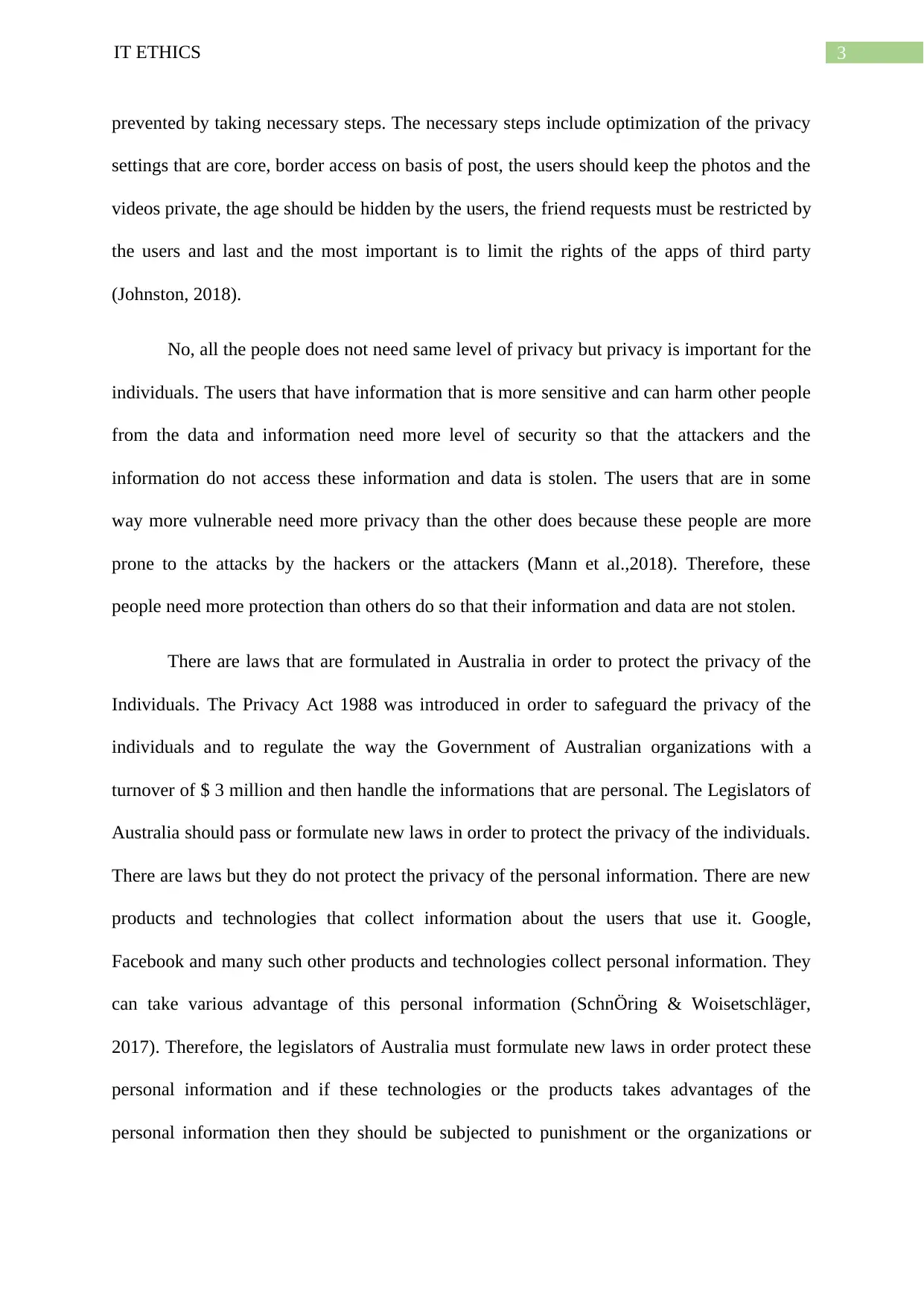
3IT ETHICS
prevented by taking necessary steps. The necessary steps include optimization of the privacy
settings that are core, border access on basis of post, the users should keep the photos and the
videos private, the age should be hidden by the users, the friend requests must be restricted by
the users and last and the most important is to limit the rights of the apps of third party
(Johnston, 2018).
No, all the people does not need same level of privacy but privacy is important for the
individuals. The users that have information that is more sensitive and can harm other people
from the data and information need more level of security so that the attackers and the
information do not access these information and data is stolen. The users that are in some
way more vulnerable need more privacy than the other does because these people are more
prone to the attacks by the hackers or the attackers (Mann et al.,2018). Therefore, these
people need more protection than others do so that their information and data are not stolen.
There are laws that are formulated in Australia in order to protect the privacy of the
Individuals. The Privacy Act 1988 was introduced in order to safeguard the privacy of the
individuals and to regulate the way the Government of Australian organizations with a
turnover of $ 3 million and then handle the informations that are personal. The Legislators of
Australia should pass or formulate new laws in order to protect the privacy of the individuals.
There are laws but they do not protect the privacy of the personal information. There are new
products and technologies that collect information about the users that use it. Google,
Facebook and many such other products and technologies collect personal information. They
can take various advantage of this personal information (SchnÖring & Woisetschläger,
2017). Therefore, the legislators of Australia must formulate new laws in order protect these
personal information and if these technologies or the products takes advantages of the
personal information then they should be subjected to punishment or the organizations or
prevented by taking necessary steps. The necessary steps include optimization of the privacy
settings that are core, border access on basis of post, the users should keep the photos and the
videos private, the age should be hidden by the users, the friend requests must be restricted by
the users and last and the most important is to limit the rights of the apps of third party
(Johnston, 2018).
No, all the people does not need same level of privacy but privacy is important for the
individuals. The users that have information that is more sensitive and can harm other people
from the data and information need more level of security so that the attackers and the
information do not access these information and data is stolen. The users that are in some
way more vulnerable need more privacy than the other does because these people are more
prone to the attacks by the hackers or the attackers (Mann et al.,2018). Therefore, these
people need more protection than others do so that their information and data are not stolen.
There are laws that are formulated in Australia in order to protect the privacy of the
Individuals. The Privacy Act 1988 was introduced in order to safeguard the privacy of the
individuals and to regulate the way the Government of Australian organizations with a
turnover of $ 3 million and then handle the informations that are personal. The Legislators of
Australia should pass or formulate new laws in order to protect the privacy of the individuals.
There are laws but they do not protect the privacy of the personal information. There are new
products and technologies that collect information about the users that use it. Google,
Facebook and many such other products and technologies collect personal information. They
can take various advantage of this personal information (SchnÖring & Woisetschläger,
2017). Therefore, the legislators of Australia must formulate new laws in order protect these
personal information and if these technologies or the products takes advantages of the
personal information then they should be subjected to punishment or the organizations or
Paraphrase This Document
Need a fresh take? Get an instant paraphrase of this document with our AI Paraphraser
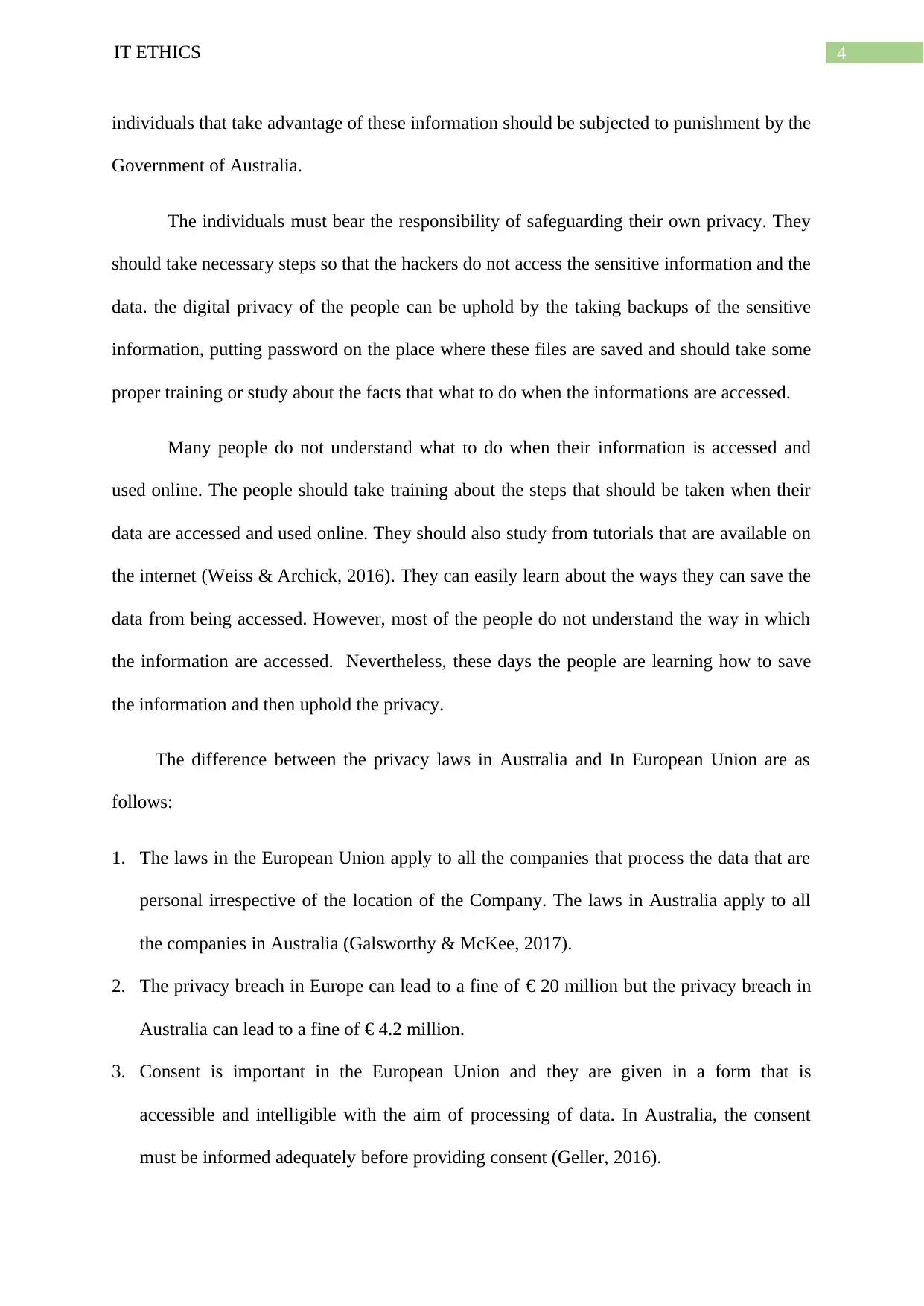
4IT ETHICS
individuals that take advantage of these information should be subjected to punishment by the
Government of Australia.
The individuals must bear the responsibility of safeguarding their own privacy. They
should take necessary steps so that the hackers do not access the sensitive information and the
data. the digital privacy of the people can be uphold by the taking backups of the sensitive
information, putting password on the place where these files are saved and should take some
proper training or study about the facts that what to do when the informations are accessed.
Many people do not understand what to do when their information is accessed and
used online. The people should take training about the steps that should be taken when their
data are accessed and used online. They should also study from tutorials that are available on
the internet (Weiss & Archick, 2016). They can easily learn about the ways they can save the
data from being accessed. However, most of the people do not understand the way in which
the information are accessed. Nevertheless, these days the people are learning how to save
the information and then uphold the privacy.
The difference between the privacy laws in Australia and In European Union are as
follows:
1. The laws in the European Union apply to all the companies that process the data that are
personal irrespective of the location of the Company. The laws in Australia apply to all
the companies in Australia (Galsworthy & McKee, 2017).
2. The privacy breach in Europe can lead to a fine of € 20 million but the privacy breach in
Australia can lead to a fine of € 4.2 million.
3. Consent is important in the European Union and they are given in a form that is
accessible and intelligible with the aim of processing of data. In Australia, the consent
must be informed adequately before providing consent (Geller, 2016).
individuals that take advantage of these information should be subjected to punishment by the
Government of Australia.
The individuals must bear the responsibility of safeguarding their own privacy. They
should take necessary steps so that the hackers do not access the sensitive information and the
data. the digital privacy of the people can be uphold by the taking backups of the sensitive
information, putting password on the place where these files are saved and should take some
proper training or study about the facts that what to do when the informations are accessed.
Many people do not understand what to do when their information is accessed and
used online. The people should take training about the steps that should be taken when their
data are accessed and used online. They should also study from tutorials that are available on
the internet (Weiss & Archick, 2016). They can easily learn about the ways they can save the
data from being accessed. However, most of the people do not understand the way in which
the information are accessed. Nevertheless, these days the people are learning how to save
the information and then uphold the privacy.
The difference between the privacy laws in Australia and In European Union are as
follows:
1. The laws in the European Union apply to all the companies that process the data that are
personal irrespective of the location of the Company. The laws in Australia apply to all
the companies in Australia (Galsworthy & McKee, 2017).
2. The privacy breach in Europe can lead to a fine of € 20 million but the privacy breach in
Australia can lead to a fine of € 4.2 million.
3. Consent is important in the European Union and they are given in a form that is
accessible and intelligible with the aim of processing of data. In Australia, the consent
must be informed adequately before providing consent (Geller, 2016).
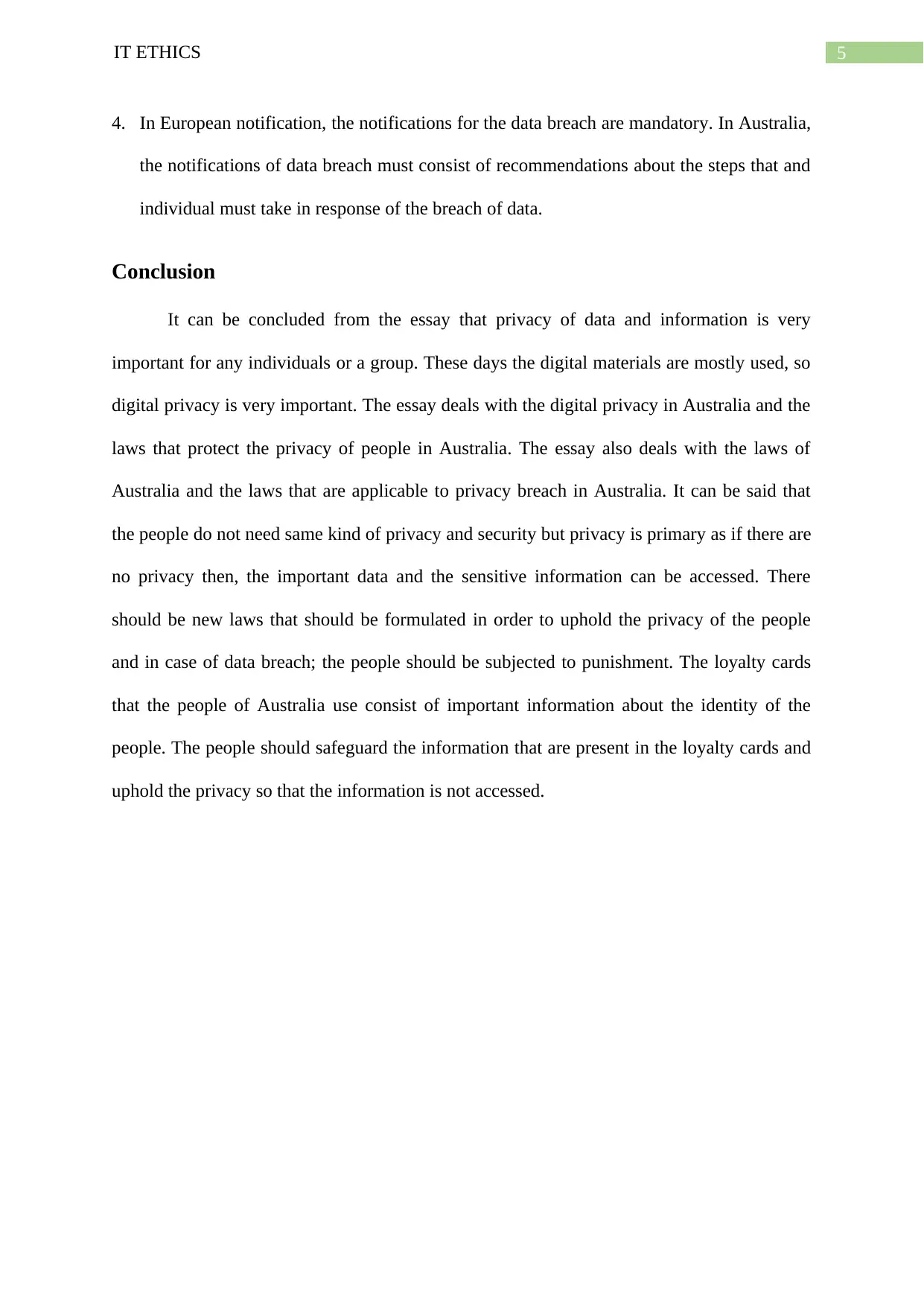
5IT ETHICS
4. In European notification, the notifications for the data breach are mandatory. In Australia,
the notifications of data breach must consist of recommendations about the steps that and
individual must take in response of the breach of data.
Conclusion
It can be concluded from the essay that privacy of data and information is very
important for any individuals or a group. These days the digital materials are mostly used, so
digital privacy is very important. The essay deals with the digital privacy in Australia and the
laws that protect the privacy of people in Australia. The essay also deals with the laws of
Australia and the laws that are applicable to privacy breach in Australia. It can be said that
the people do not need same kind of privacy and security but privacy is primary as if there are
no privacy then, the important data and the sensitive information can be accessed. There
should be new laws that should be formulated in order to uphold the privacy of the people
and in case of data breach; the people should be subjected to punishment. The loyalty cards
that the people of Australia use consist of important information about the identity of the
people. The people should safeguard the information that are present in the loyalty cards and
uphold the privacy so that the information is not accessed.
4. In European notification, the notifications for the data breach are mandatory. In Australia,
the notifications of data breach must consist of recommendations about the steps that and
individual must take in response of the breach of data.
Conclusion
It can be concluded from the essay that privacy of data and information is very
important for any individuals or a group. These days the digital materials are mostly used, so
digital privacy is very important. The essay deals with the digital privacy in Australia and the
laws that protect the privacy of people in Australia. The essay also deals with the laws of
Australia and the laws that are applicable to privacy breach in Australia. It can be said that
the people do not need same kind of privacy and security but privacy is primary as if there are
no privacy then, the important data and the sensitive information can be accessed. There
should be new laws that should be formulated in order to uphold the privacy of the people
and in case of data breach; the people should be subjected to punishment. The loyalty cards
that the people of Australia use consist of important information about the identity of the
people. The people should safeguard the information that are present in the loyalty cards and
uphold the privacy so that the information is not accessed.
⊘ This is a preview!⊘
Do you want full access?
Subscribe today to unlock all pages.

Trusted by 1+ million students worldwide
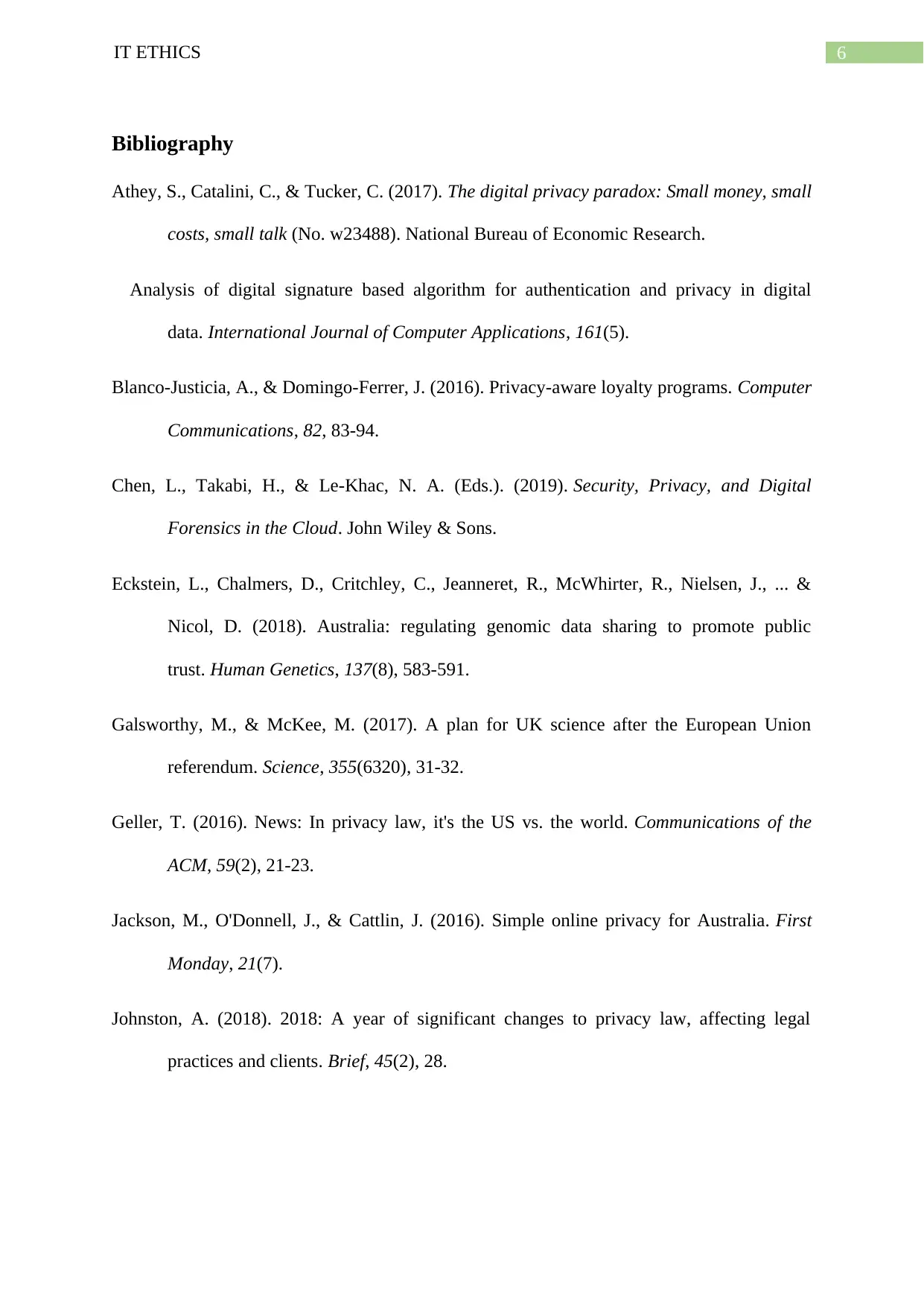
6IT ETHICS
Bibliography
Athey, S., Catalini, C., & Tucker, C. (2017). The digital privacy paradox: Small money, small
costs, small talk (No. w23488). National Bureau of Economic Research.
Analysis of digital signature based algorithm for authentication and privacy in digital
data. International Journal of Computer Applications, 161(5).
Blanco-Justicia, A., & Domingo-Ferrer, J. (2016). Privacy-aware loyalty programs. Computer
Communications, 82, 83-94.
Chen, L., Takabi, H., & Le-Khac, N. A. (Eds.). (2019). Security, Privacy, and Digital
Forensics in the Cloud. John Wiley & Sons.
Eckstein, L., Chalmers, D., Critchley, C., Jeanneret, R., McWhirter, R., Nielsen, J., ... &
Nicol, D. (2018). Australia: regulating genomic data sharing to promote public
trust. Human Genetics, 137(8), 583-591.
Galsworthy, M., & McKee, M. (2017). A plan for UK science after the European Union
referendum. Science, 355(6320), 31-32.
Geller, T. (2016). News: In privacy law, it's the US vs. the world. Communications of the
ACM, 59(2), 21-23.
Jackson, M., O'Donnell, J., & Cattlin, J. (2016). Simple online privacy for Australia. First
Monday, 21(7).
Johnston, A. (2018). 2018: A year of significant changes to privacy law, affecting legal
practices and clients. Brief, 45(2), 28.
Bibliography
Athey, S., Catalini, C., & Tucker, C. (2017). The digital privacy paradox: Small money, small
costs, small talk (No. w23488). National Bureau of Economic Research.
Analysis of digital signature based algorithm for authentication and privacy in digital
data. International Journal of Computer Applications, 161(5).
Blanco-Justicia, A., & Domingo-Ferrer, J. (2016). Privacy-aware loyalty programs. Computer
Communications, 82, 83-94.
Chen, L., Takabi, H., & Le-Khac, N. A. (Eds.). (2019). Security, Privacy, and Digital
Forensics in the Cloud. John Wiley & Sons.
Eckstein, L., Chalmers, D., Critchley, C., Jeanneret, R., McWhirter, R., Nielsen, J., ... &
Nicol, D. (2018). Australia: regulating genomic data sharing to promote public
trust. Human Genetics, 137(8), 583-591.
Galsworthy, M., & McKee, M. (2017). A plan for UK science after the European Union
referendum. Science, 355(6320), 31-32.
Geller, T. (2016). News: In privacy law, it's the US vs. the world. Communications of the
ACM, 59(2), 21-23.
Jackson, M., O'Donnell, J., & Cattlin, J. (2016). Simple online privacy for Australia. First
Monday, 21(7).
Johnston, A. (2018). 2018: A year of significant changes to privacy law, affecting legal
practices and clients. Brief, 45(2), 28.
Paraphrase This Document
Need a fresh take? Get an instant paraphrase of this document with our AI Paraphraser
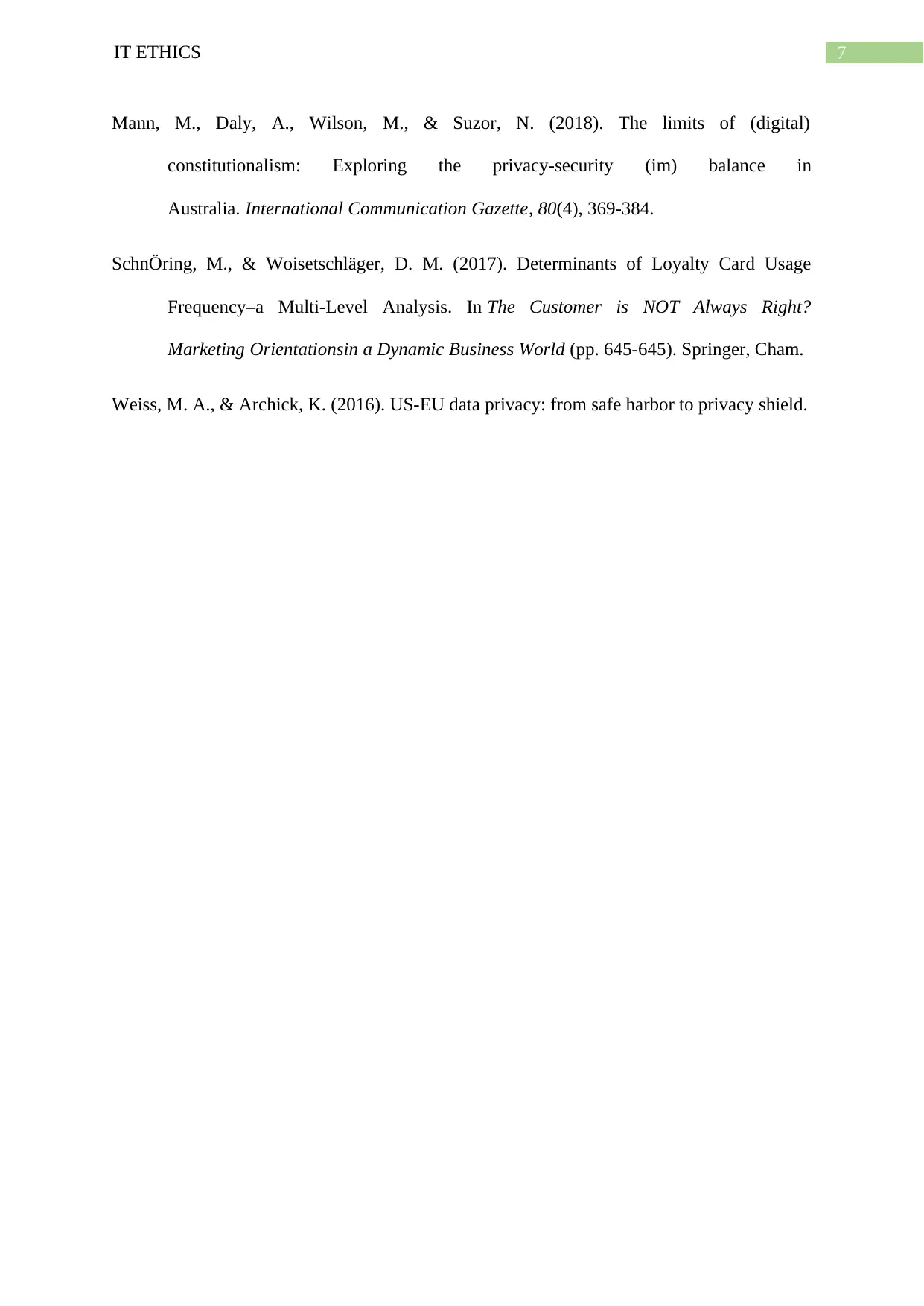
7IT ETHICS
Mann, M., Daly, A., Wilson, M., & Suzor, N. (2018). The limits of (digital)
constitutionalism: Exploring the privacy-security (im) balance in
Australia. International Communication Gazette, 80(4), 369-384.
SchnÖring, M., & Woisetschläger, D. M. (2017). Determinants of Loyalty Card Usage
Frequency–a Multi-Level Analysis. In The Customer is NOT Always Right?
Marketing Orientationsin a Dynamic Business World (pp. 645-645). Springer, Cham.
Weiss, M. A., & Archick, K. (2016). US-EU data privacy: from safe harbor to privacy shield.
Mann, M., Daly, A., Wilson, M., & Suzor, N. (2018). The limits of (digital)
constitutionalism: Exploring the privacy-security (im) balance in
Australia. International Communication Gazette, 80(4), 369-384.
SchnÖring, M., & Woisetschläger, D. M. (2017). Determinants of Loyalty Card Usage
Frequency–a Multi-Level Analysis. In The Customer is NOT Always Right?
Marketing Orientationsin a Dynamic Business World (pp. 645-645). Springer, Cham.
Weiss, M. A., & Archick, K. (2016). US-EU data privacy: from safe harbor to privacy shield.
1 out of 8
Related Documents
Your All-in-One AI-Powered Toolkit for Academic Success.
+13062052269
info@desklib.com
Available 24*7 on WhatsApp / Email
![[object Object]](/_next/static/media/star-bottom.7253800d.svg)
Unlock your academic potential
Copyright © 2020–2026 A2Z Services. All Rights Reserved. Developed and managed by ZUCOL.

![NIT2201 - Online Privacy: An Analytical Essay - [University Name]](/_next/image/?url=https%3A%2F%2Fdesklib.com%2Fmedia%2Fimages%2Fgc%2F0656cbdd520f46bb97c676d8d876831a.jpg&w=256&q=75)



